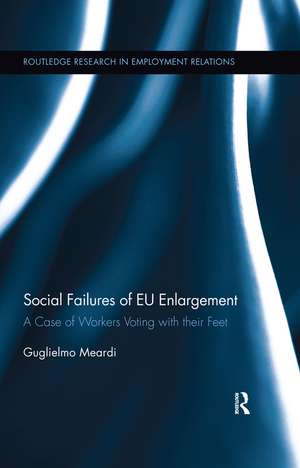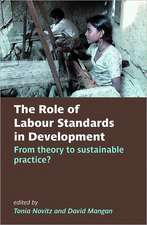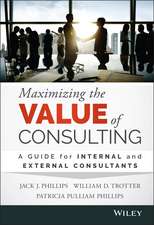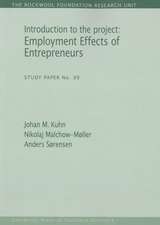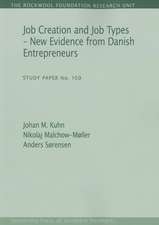Social Failures of EU Enlargement: A Case of Workers Voting with their Feet: Routledge Research in Employment Relations
Autor Guglielmo Meardien Limba Engleză Paperback – 15 iul 2016
Drawing on Hirschman’s concepts of ‘Exit’ and ‘Voice’, the book traces the origins of such failures in the management of EU enlargement as a pure economic and market-creating exercise, neglecting the inherently political nature of labour relations. The reinforcement of market mechanisms without political counterbalances has resulted in an increase in opportunistic ‘exit’ behaviour by both employers and employees, and thereby in a worsening quality of democracy, at workplace, national and European levels. As a result of this process, the EU has become more similar to the North American Free Trade Agreement between USA, Canada and Mexico, where social rights are marginalized and economic integration does not translate into better development.
| Toate formatele și edițiile | Preț | Express |
|---|---|---|
| Paperback (1) | 489.57 lei 6-8 săpt. | |
| Taylor & Francis – 15 iul 2016 | 489.57 lei 6-8 săpt. | |
| Hardback (1) | 1060.52 lei 6-8 săpt. | |
| Taylor & Francis – 24 oct 2011 | 1060.52 lei 6-8 săpt. |
Din seria Routledge Research in Employment Relations
- 9%
 Preț: 934.94 lei
Preț: 934.94 lei -
 Preț: 231.55 lei
Preț: 231.55 lei -
 Preț: 416.22 lei
Preț: 416.22 lei -
 Preț: 414.91 lei
Preț: 414.91 lei -
 Preț: 414.32 lei
Preț: 414.32 lei - 12%
 Preț: 301.33 lei
Preț: 301.33 lei - 18%
 Preț: 1000.27 lei
Preț: 1000.27 lei - 12%
 Preț: 301.55 lei
Preț: 301.55 lei - 15%
 Preț: 293.39 lei
Preț: 293.39 lei - 18%
 Preț: 1221.12 lei
Preț: 1221.12 lei -
 Preț: 416.22 lei
Preț: 416.22 lei - 18%
 Preț: 1064.01 lei
Preț: 1064.01 lei -
 Preț: 489.26 lei
Preț: 489.26 lei -
 Preț: 428.40 lei
Preț: 428.40 lei -
 Preț: 416.22 lei
Preț: 416.22 lei - 12%
 Preț: 301.55 lei
Preț: 301.55 lei - 18%
 Preț: 1000.27 lei
Preț: 1000.27 lei - 26%
 Preț: 766.31 lei
Preț: 766.31 lei - 25%
 Preț: 824.40 lei
Preț: 824.40 lei - 26%
 Preț: 876.36 lei
Preț: 876.36 lei - 13%
 Preț: 294.77 lei
Preț: 294.77 lei -
 Preț: 485.07 lei
Preț: 485.07 lei - 15%
 Preț: 440.67 lei
Preț: 440.67 lei - 18%
 Preț: 1330.04 lei
Preț: 1330.04 lei - 26%
 Preț: 875.16 lei
Preț: 875.16 lei - 26%
 Preț: 765.62 lei
Preț: 765.62 lei - 15%
 Preț: 426.34 lei
Preț: 426.34 lei -
 Preț: 416.22 lei
Preț: 416.22 lei -
 Preț: 416.22 lei
Preț: 416.22 lei -
 Preț: 377.23 lei
Preț: 377.23 lei - 26%
 Preț: 875.55 lei
Preț: 875.55 lei - 18%
 Preț: 1117.43 lei
Preț: 1117.43 lei -
 Preț: 415.24 lei
Preț: 415.24 lei - 18%
 Preț: 1056.28 lei
Preț: 1056.28 lei
Preț: 489.57 lei
Nou
Puncte Express: 734
Preț estimativ în valută:
93.68€ • 97.81$ • 77.53£
93.68€ • 97.81$ • 77.53£
Carte tipărită la comandă
Livrare economică 05-19 aprilie
Preluare comenzi: 021 569.72.76
Specificații
ISBN-13: 9781138203013
ISBN-10: 1138203017
Pagini: 248
Ilustrații: 2
Dimensiuni: 152 x 229 mm
Greutate: 0.46 kg
Ediția:1
Editura: Taylor & Francis
Colecția Routledge
Seria Routledge Research in Employment Relations
Locul publicării:Oxford, United Kingdom
ISBN-10: 1138203017
Pagini: 248
Ilustrații: 2
Dimensiuni: 152 x 229 mm
Greutate: 0.46 kg
Ediția:1
Editura: Taylor & Francis
Colecția Routledge
Seria Routledge Research in Employment Relations
Locul publicării:Oxford, United Kingdom
Public țintă
Postgraduate and UndergraduateCuprins
Introduction Part I: Betrayal 1. The ‘Hard Acquis’ and Its Avoidance 2. The ‘Soft Acquis’ and Social Dialog As Talk Show 3. The Hoped Transfer through Foreign Investment Part II: Exit 4. Migration 5. Political Absenteeism and Populism 6.Organizational Exit and Misbehavior Part III: Voice? 7. The Possibilities of Trade Union Revitalization 8. Cross-Border Experiments 9. Other Voices Conclusion
Recenzii
‘Meardi has written a truly informative book about European integration. Based on fifteen years of research and a deep knowledge of Central and Eastern European countries, he covers such issues as human resource management in multinationals, the revitalization of unions, the causes and effects of labor migration. He succeeds in demolishing the illusion that Europe has liberalized its economy while protecting its societies, without succumbing to reactionary Euro-skepticism. Students and researchers alike will benefit from this book.’ – Ian Greer, Leeds University
‘The volume presents a profound, fairly detailed and concise, up dated, so far non-existing overview of heterogeneous dimensions of EU enlargement - and its fundamental social failures. It constitutes the ideal companion of the few available introductory textbooks dealing mainly with industrial and/or employment relations in the old EU member states. It has to be highly recommended for all practitioners as well as scholars who are interested in European integration in general and its consequences for industrial relations in particular.’ – Berndt Keller, University of Konstanz, Germany
‘In this excellent book, Guglielmo Meardi offers a compelling analysis of the social failures of the EU enlargement to the East. He argues that EU enlargement did not establish a capitalist paradise despite the betrayal of labor’s expectations. The exodus of eastern workers to the west, the rise of political populism, the low organizational loyalty of eastern workers towards their new masters, and occasional local, national, and transnational trade union action has forced governments and multinationals corporations to temper their neoliberal policies towards labor.’ – Roland Erne, University College Dublin
‘Meardi has written a compelling book that deserves wide attention. It is well grounded in case studies and an extensive knowledge of industrial relations in the new member states of the EU. But it also makes a powerful argument that the consequences of labor’s limited voice in these societies extends well beyond the confines of the workplace, and also impacts labor migration, social policy, as well as the quality of capitalism and democracy in the region, in indeed throughout the European Union. Anyone interested in these issues would do well to read this book.’ – Stephen Crowely, Oberlin College, USA
'An excellent book that addresses critically and engagingly many of the preconceptions surrounding the eastern enlargement of the European Union.' - Dorothee Bohle, Central European University, Hungary
'Imaginative and plausible analysis of exactly what enlargement means for ‘social Europe’… this immensely stimulating book deserves wide readership.' - Michael Gold, Royal Holloway University of London
‘The volume presents a profound, fairly detailed and concise, up dated, so far non-existing overview of heterogeneous dimensions of EU enlargement - and its fundamental social failures. It constitutes the ideal companion of the few available introductory textbooks dealing mainly with industrial and/or employment relations in the old EU member states. It has to be highly recommended for all practitioners as well as scholars who are interested in European integration in general and its consequences for industrial relations in particular.’ – Berndt Keller, University of Konstanz, Germany
‘In this excellent book, Guglielmo Meardi offers a compelling analysis of the social failures of the EU enlargement to the East. He argues that EU enlargement did not establish a capitalist paradise despite the betrayal of labor’s expectations. The exodus of eastern workers to the west, the rise of political populism, the low organizational loyalty of eastern workers towards their new masters, and occasional local, national, and transnational trade union action has forced governments and multinationals corporations to temper their neoliberal policies towards labor.’ – Roland Erne, University College Dublin
‘Meardi has written a compelling book that deserves wide attention. It is well grounded in case studies and an extensive knowledge of industrial relations in the new member states of the EU. But it also makes a powerful argument that the consequences of labor’s limited voice in these societies extends well beyond the confines of the workplace, and also impacts labor migration, social policy, as well as the quality of capitalism and democracy in the region, in indeed throughout the European Union. Anyone interested in these issues would do well to read this book.’ – Stephen Crowely, Oberlin College, USA
'An excellent book that addresses critically and engagingly many of the preconceptions surrounding the eastern enlargement of the European Union.' - Dorothee Bohle, Central European University, Hungary
'Imaginative and plausible analysis of exactly what enlargement means for ‘social Europe’… this immensely stimulating book deserves wide readership.' - Michael Gold, Royal Holloway University of London
Descriere
This book provides a blunt assessment of EU enlargement eastwards, based on fifteen years of fieldwork research across Central and Eastern Europe, through a focus on the hitherto neglected social and employment problems at three levels: the largely failed implementation of EU social regulations; social dumping and relocation threats operated by multinational companies; and migration flows resulting in increased worker vulnerability. This is the first critical book on EU enlargement from a social sciences perspective. Unlike existing books on EU enlargement, this volume considers geopolitical and institutional aspects and assesses the link between EU, national and company levels.
